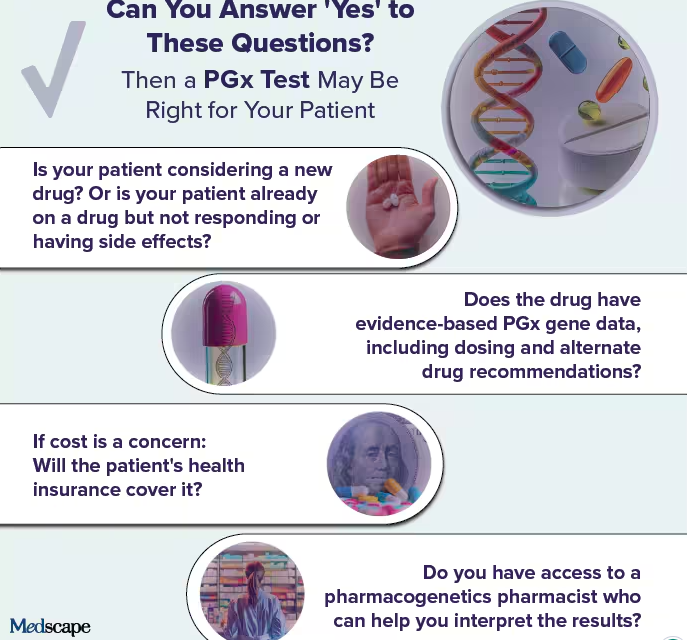Imagine a world where doctors can determine if a drug will work for a patient before it’s even prescribed. This world is becoming a reality thanks to pharmacogenetics, a field that tests patients for genetic differences that affect how well drugs work and the side effects they may cause.
“About 9 out of 10 people will have a genetic difference in their DNA that can impact how they respond to common medications,” said Emily J. Cicali, PharmD, a clinical associate at the University of Florida College of Pharmacy.
Cicali is the clinical director of UF Health’s MyRx, a virtual program providing pharmacogenetic (PGx) tests and expert interpretation to residents in Florida and New Jersey. According to Kristin Wiisanen, PharmD, dean of the College of Pharmacy at Rosalind Franklin University of Medicine and Science, genetic factors are thought to contribute to about 25% or more of inappropriate drug responses or adverse events.
The Power of Pharmacogenetics
Pharmacogenetics provides a personalized approach to medicine by helping consumers avoid drugs that may not work well for them or could cause serious adverse events. A simple cheek swab or blood sample can reveal inherited gene variants that affect how the body processes medications, ranging from antidepressants to chemotherapy agents.
These tests work by identifying genes that control drug metabolism. “You have several different drug-metabolizing enzymes in your liver,” explained Cicali. “Pharmacogenetic tests look for gene variants that encode for these enzymes.” Depending on these variants, patients can be ultrarapid metabolizers, who process drugs quickly, or poor metabolizers, who process drugs slowly, leading to prolonged effects and potential side effects.
Growing Acceptance and Legislative Support
Pharmacogenetics, though still emerging, is gaining traction as test prices drop, insurance coverage expands, and research on gene-drug interactions increases. Legislation like the Right Drug Dose Now Act of 2024 aims to boost public awareness and integrate PGx test results into electronic health records.
“The use of pharmacogenetic data to guide prescribing is growing rapidly,” said Wiisanen. “It’s becoming a routine part of drug therapy for many medications.”
Research and Real-World Impact
Research underscores the impact of pharmacogenetics. The Mayo-Baylor RIGHT 10K Study found that gene variants affecting drug metabolism are common, with over 99% of study participants having at least one variant. Incorporating genetic data into electronic health records and alerting clinicians led to changes in drug prescriptions for over half of the participants, improving treatment outcomes.
For instance, one participant stopped experiencing dizziness after discontinuing tramadol, a pain medication, due to poor metabolism. Another participant achieved full remission from major depression after adjusting the dose of their antidepressant based on genetic testing results.
Pharmacogenetics in Practice
Pharmacogenetics is already recommended or required before prescribing certain medications, such as abacavir for HIV, irinotecan for colon cancer, and mercaptopurine for acute lymphoblastic leukemia. These tests help prevent severe side effects and ensure the medication is effective.
Making Pharmacogenetics Accessible
Consumers and physicians can choose from various PGx tests, some available directly to consumers. However, because the field is new, finding the right test requires research. Laboratories should be accredited, and the tests should look for gene variants with well-documented effects on drug metabolism.
The cost of PGx tests varies, and insurance coverage is not always guaranteed. Medicare and some state Medicaid programs cover certain tests, but consumers should check specific coverage details.
Understanding and Utilizing Results
As pharmacogenetics becomes more integrated into healthcare, consults with pharmacogenetics pharmacists can help interpret test results. CPIC guidelines and FDA resources provide valuable information on how to use genetic data in prescribing decisions.
For those considering PGx testing, it’s important to work with healthcare providers to ensure a comprehensive understanding of how genetic factors influence drug responses. This collaborative approach helps tailor treatments to individual needs, enhancing the safety and efficacy of medications.
The Future of Personalized Medicine
Pharmacogenetics is poised to transform healthcare by making drug therapy more personalized and effective. As more people and healthcare providers embrace this innovative approach, the potential for improved patient outcomes and reduced adverse drug reactions becomes increasingly tangible.
By harnessing the power of genetic information, pharmacogenetics promises a future where medicine is truly tailored to each individual’s unique genetic makeup, paving the way for safer and more effective treatments.












